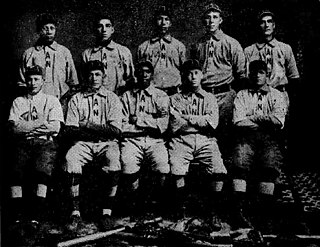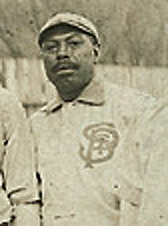
John Wesley Donaldson was an American baseball pitcher in Pre-Negro league and Negro league baseball. In a career that spanned over 30 years, he played for many different Negro league and semi-professional teams, including the All Nations team and the Kansas City Monarchs. Researchers so far have discovered 667 games in which Donaldson is known to have pitched. Out of those games, Donaldson had over 400 wins and 5,081 strikeouts as a baseball pitcher. According to some sources, he was the greatest pitcher of his era.

James Leslie Wilkinson was an American sports executive who founded the All Nations baseball club in 1912, and the Negro league baseball team Kansas City Monarchs in 1920.

Herbert Sylvester Sincock was a left-handed pitcher in Major League Baseball. In 1908, he played both college baseball at the University of Michigan and professional baseball for the Cincinnati Reds.

Albert J. "Cozy" Dolan was a Major League Baseball player. The 5 ft 10 in (1.78 m), 160-pound outfielder and third baseman played for six teams; the Cincinnati Reds (1909), the New York Highlanders (1911–1912), the Philadelphia Phillies (1912–1913), the Pittsburgh Pirates (1913), the St. Louis Cardinals (1914–1915) and the New York Giants (1922). Over his career he posted career numbers of 299 hits, 210 runs, 102 stolen bases, a .339 Slugging percentage, and a .252 batting average.
Fay Holderness was an American vaudeville performer and film actress.

All Nations was a barnstorming professional baseball team that toured the Midwest from 1912 to 1918, and again in 1920 and 1921, and from 1923 to 1925. It derived its name from the fact that its team included players of several nationalities, including blacks and whites, Indians, Hawaiians, Japanese and Latin Americans. The team was founded by the Hopkins Brothers sporting goods stores. One day, however, the team's manager absconded with the daily gate proceeds. J. L. Wilkinson, who played for the team, replaced him as manager, later becoming owner as well. The team was based out of Kansas City and Des Moines.
Ralph Carl Ceder was an American film director and writer. He directed 88 films in the 1920s, 1930s, and 1940s.

Samuel "Sam" Crawford was an American pitcher and manager in baseball's Negro Leagues.

Frank "Blukoi" Blattner was an American Utility player almost exclusively working for J. L. Wilkinson teams All Nations and the Kansas City Monarchs from 1912 until 1922.
Clarence "Pops" Coleman was an American baseball catcher in the pre-Negro leagues. He played for the All Nations, Chicago Union Giants, and the Indianapolis ABCs and was about 36 years old and past his prime when the Negro National League was formed in 1920, so he did not make the cut against younger players.

William H. Binga was an American third baseman, catcher and manager in the pre-Negro League baseball era. Born in Michigan, Binga played most of his career in Chicago, Illinois, Philadelphia, Pennsylvania, and Minneapolis, Minnesota.

F. Sylvester "Hooks" Foreman was an American baseball catcher in the Negro Leagues. He played from 1921 to 1933, playing with several teams.
Herbert Todd Allen was a Negro leagues third baseman and manager for several years before the founding of the first Negro National League.
Claude "Steel Arm" Dickey was a Negro Leagues pitcher for the first Negro Southern League and Negro National League. Researchers currently believe his real name is Claude Dickey, based on census records and World War I draft registration cards. Newspaper reports show he appears as Walter Claude, John Claude, and Jean Claude. Many reports simply call him Steel Arm Dickey.

Charles Ball was the third and fifth President of the Chico Board of Trustees, the governing body of the city of Chico, California from 1876 to 1879, and from 1882 to 1885. He was a jeweler and watchmaker.
Isham Kimbell Hicks was an American physician and three-term mayor of Melbourne, Florida from 1933 to 1934 and from 1942 to 1943.
Oliver Lovell Clark was the fifteenth President of the Chico Board of Trustees, the governing body of Chico, California from 1899 to 1907.
Richard William Thies is an actor. He is credited in his film and television appearances as Dick Thies, was a Western actor, playing villains in the 1960s.
Paul Frederick Brissenden was an American labor historian, who wrote on various labor issues in the first half of the 20th century. He is perhaps best known for his 1919 work on the Industrial Workers of the World, entitled The IWW: a Study of American Syndicalism.
Captain Ralph Erksine Peasley "Captain Matt" is a sea captain from the Pacific Northwest who became famous due to a popular series of short stories by Peter Bernard Kyne called Cappy Ricks or the Subjugation of Matt Peasley.










